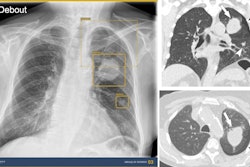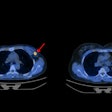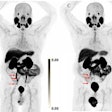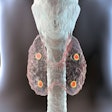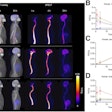An AI model based on F-18 DCFPyL PSMA-PET/CT images shows promise for predicting treatment response in patients with metastatic castration-resistant prostate cancer (mCRPC), according to a study presented November 30 at RSNA in Chicago.
The deep-learning model was trained on PET/CT imaging from 128 patients and identified a high-risk subgroup who may benefit from focused care or alternative therapies, said Andrew Voter, MD, of Johns Hopkins Medicine in Baltimore, MD.
“Despite widespread adoption of prostate-specific membrane antigen [PSMA] PET/CT imaging for prostate cancer, prognostication of patient outcomes remains challenging,” he noted.
To that end, Voter and colleagues tested the feasibility of a multimodal fusion 3D convolutional neural network (CNN) to identify patients at risk for progression based on baseline PSMA-PET/CT imaging.
The training set included baseline PSMA-PET/CT scans using F-18 DCFPyL radiotracer (Pylarify, Lantheus Medical Imaging) and follow-up scans over three years from 148 patients (age, 71.7 ± 8.4 years; average PSA levels, 19.4) with mCRPC. In these, a total of 1,781 radiotracer-avid foci were labeled as suspicious for malignancy. Lesions were classified as either progressive or nonprogressive based on increased radiotracer avidity or a greater than 2 mm increase in size.
Next, the researchers validated the model using an independent test set of PET/CT images comprising 320 lesions from 34 patients (age, 72.2 ± 7.1 years; average PSA levels 18.5).
For classifying images with progressive versus non-progressive disease, the model achieved an accuracy of 82%, an area under the curve (AUC) of 0.615, and per-lesion positive predictive value of 83%, according to the findings.
In addition, further analysis revealed that images classified as progressive by the algorithm were associated with a high-risk population with significantly reduced median survival (26.1 months) relative to the remaining population (57.4 months, p = 0.04), Voter added.
“We developed a DL model to predict lesion and patient-level treatment response using PSMA PET/CT scans. Our DL model was able to identify mCRPC patients at high risk for progression,” Voter said.
PSMA-PET/CT is an invaluable tool for the management of mCRPC, with the study ultimately demonstrating its value in prognostication by stratifying patient outcomes and identifying a high-risk subgroup, Voter said.
More data will be key moving forward, and the group plans to incorporate a data set of PSMA-PET/CT images they recently acquired from the National Institutes of Health in this study, Voter said.
“Further studies are warranted to determine the clinical implications of our deep learning model,” he concluded.







